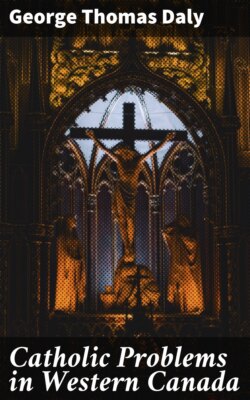Читать книгу Catholic Problems in Western Canada - George Thomas Daly - Страница 36
На сайте Литреса книга снята с продажи.
A "DESK-POLICY" OF APOSTLESHIP
ОглавлениеThe Catholic Church in Canada possesses a Home Missionary problem of the extent of which we can scarcely form an idea. In making his appeal from the West to the East of the vast Dominion, Father Daly, C.S.S.R., who has just issued a pamphlet on the subject through the Church Extension Press, Toronto, brings out some salient truths on the subject of co-operation and organization which Catholics all the world over can well take to heart and apply to themselves. "Two conditions (he says) made united action possible—uniform plan and authoritative leadership. To readjust our methods to conditions as we find them means efficiency with the least waste of energy, and acting on this principle Father Daly advocates a 'survey' of membership and conditions of the Catholic Church in unorganized districts as the one means of getting at lapsed Catholics. 'Too often,' he observes, 'we are waiting for the fallen away to come to us.' This is true indeed. Protestant proselytizers in the west of Canada have the whole 'survey' scheme worked out on a scientific basis. Father Daly is more willing to learn from them. "I am a firm believer," he writes, "in what I would call the Catholicization of modern methods that have proved beneficial in any cause." The problem of unorganized districts and of a scattered Catholic population in our own case is, of course, minute compared with that of Canada; but it is there, and sufficiently in evidence to justify the Redemptorist Father's "desk-policy of apostleship." There is no reason, in short, why the interorganization of the members of the most perfect organization in the world should be committed to a kind of spiritual rule of thumb."
[3] The following letter prompted by the reading of this very article was received by the President of the Church Extension, dated, March 14, 1919, at a point of Saskatchewan we know quite well; it is illustrative of conditions prevailing in many districts of our Great West:
Very Reverend and dear Father—
I have just read your article in the Febr., 15 issue and I am so pleased with your suggestion for relieving the situation for scattered Catholics throughout the West that I must write my appreciation. I am sure that very few people in the East realize what a veritable necessity those Free Lances you spoke of are to so many Western people, or what a God-send those auto-chapels would be. Western homesteaders do not stray far from home for two very good reasons, lack of transportation facilities and lack of funds.
We live 12 miles from the church, that is my own family. The others live thirty-five and fifty miles away and up to this year we have had nothing but a waggon to travel in, and now those that live farthest away have still only a waggon. So you will understand that we have not made more than necessary trips or not many more. And I wonder if my brothers would make those, were it not for my mothers insistence. They are surrounded by such bad influences. It's not that it is a sectarian influence, but rather a total lack of religion altogether. The only things that matter greatly are the material things of this world. To confess yourself religious, especially Catholic, is to confess yourself old fashioned and to cause people to smile. You know that is harder to combat than bigoted opposition. Your plan to send out pamphlets would be appreciated by many—But above all we need the personal touch of a priest. We need it as our crops need rain, etc. …
[4] As an illustration of what in a simple and unostentatious way can be done by any parish in the mission cause the editor of the Annals of the Propagation of the Faith (N.Y.) refers to an invitation extended to him to attend a Christmas sale. It took place in a parish of the Brooklyn diocese on Dec. 3, 1919, the feast of St. Francis Xavier, patron of the mission cause. Thanks mainly to the efforts of an energetic lady, but with the consent and patronage of the pastor, a Xavirian Mission Circle had been formed. Within eighteen months after its organization the newly found circle had paid off a $500.00 mortgage for a heavily burdened priest in the South, had adopted eight abandoned children of the Chinese Missions, had sent 1,000 Mass intentions, was supporting seven catechists in Africa, India, and China, was educating a Chinese seminarian, had given 150 volumes to the parochial library of a bigoted section in the South, and was able then to place upon exhibition a number of sacred vessels that were to be forwarded as gifts to poor priests. "And did all these activities not interfere with your parochial work?" Mgr. Freri asked the pastor. "Not in the least"—was the answer—"My collections have never been larger." "EVEN PROTESTANTISM FINDS THAT HOME COLLECTIONS ARE IN DIRECT PROPORTION TO THE MISSION GIFTS."
